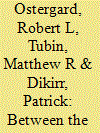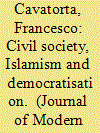|
|
|
Sort Order |
|
|
|
Items / Page
|
|
|
|
|
|
|
| Srl | Item |
| 1 |
ID:
072282


|
|
|
|
|
| Publication |
2006.
|
| Summary/Abstract |
In the modern global economy, transnational corporations have become important sources of technology, market access and capital - all of which states seek in propelling economic growth. States themselves provide territory, and establish the 'rules of the game' by which corporations may operate within that territory. However, with the commodification and commercialisation of indigenous cultural and intellectual property, states are bypassed and negotiations emerge between corporations and sub-state actors who claim to represent population segments. May the bypassing of the state further weaken national or state identity among indigenous groups? Such is the case that may be emerging in Africa with groups who claim profits derived from the development and marketing of indigenous cultural and intellectual property. This paper explores the possibility that profit-sharing agreements between transnational corporations and sub-state groups may contribute to the widening of ethnic cleavages in African states by promoting inequalities between groups.
|
|
|
|
|
|
|
|
|
|
|
|
|
|
|
|
| 2 |
ID:
072279


|
|
|
|
|
| Publication |
2006.
|
| Summary/Abstract |
The positive role that an active civil society plays in processes of democratisation is often highlighted in the literature. However, when it comes to the Middle East and North Africa, such activism is considered to be detrimental to democratisation because the predominant role is played by Islamist groups. The explanation for this rests with the perceived 'uncivil' and undemocratic Islamist ethos of such groups. This paper challenges this assumption and argues that Islamist associations can be a potential force for democratisation for three reasons. First, they are capable of political learning; secondly, they generate secular civil society activism as a response to their activities, increasing the number of actors in the political and social system; and finally, they can cooperate with other civil society groups on a number of issues, given that they are all subject to the same authoritarian constraints. The paper focuses in particular on the case of Morocco and the Islamist group Jamiat al-Adl wal-Ihsan.
|
|
|
|
|
|
|
|
|
|
|
|
|
|
|
|
| 3 |
ID:
072281


|
|
|
|
|
| Publication |
2006.
|
| Summary/Abstract |
A major challenge for transitioning states is to create a constituency of citizens to support and defend the new constitution. Participatory constitution-making is one of the most often recommended methods for enhancing constitutional legitimacy. This research tests the claim that public participation in the Ugandan constitution-making process built support for the 1995 constitution. Contrary to expectations, multivariate analysis of survey data demonstrates that citizens who were active in the process were no more supportive of the constitution than those who stayed at home. In-depth interviews reveal that local political leaders, not participation, caused citizens to view the constitution as legitimate or illegitimate. Constitutions are difficult for citizens to evaluate, so they rely on political elites for information and opinions. To predict whether participation will strengthen or weaken constitutional support, we must examine the messages that elites communicate to citizens about their participation, the process, and the resulting constitution.
|
|
|
|
|
|
|
|
|
|
|
|
|
|
|
|
| 4 |
ID:
072280


|
|
|
|
|
| Publication |
2006.
|
| Summary/Abstract |
Developing countries face considerable disadvantages in trade disputes with their more powerful and wealthier counterparts. Nonetheless, Benin, Burkina Faso and Mali successfully challenged US cotton subsidies, a watershed event in international trade relations. This article explores how the West African governments and cotton farmers confronted US policy, why they succeeded, and the campaign's likely implications. Drawing on interviews with representatives in West Africa and Geneva, public statements, documents filed with the World Trade Organisation (WTO), media coverage, and materials from non-governmental organisations, I analyse the behaviour of four key actors behind this initiative: cotton farmers, producers' unions, governments and the international financial institutions. Tactics included using the WTO's trade-dispute mechanisms, deploying many spokespeople with common messages, enlisting powerful allies, and using the media. The West African campaign is an example of politically weak countries effectively exploiting the liberal economic principles of multilateral institutions to challenge protectionist policies in the industrialised world.
|
|
|
|
|
|
|
|
|
|
|
|
|
|
|
|
|
|
|
|
|